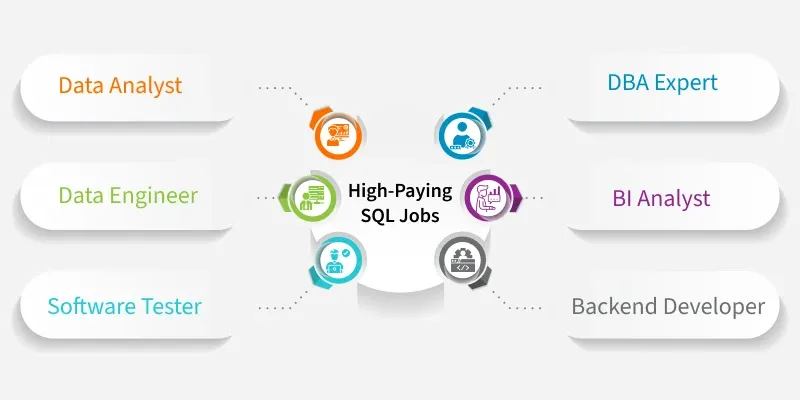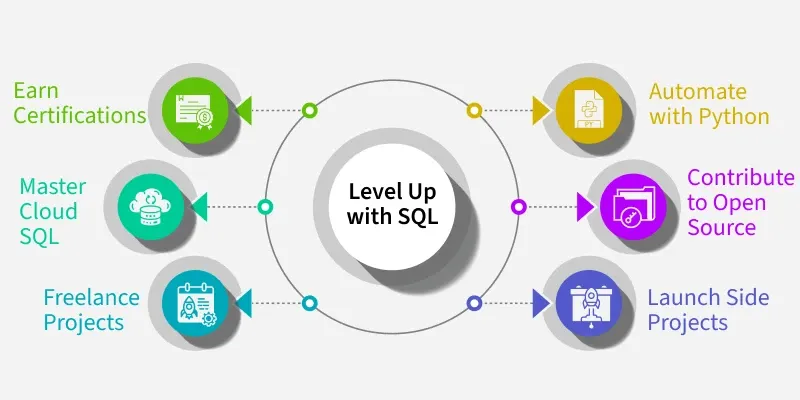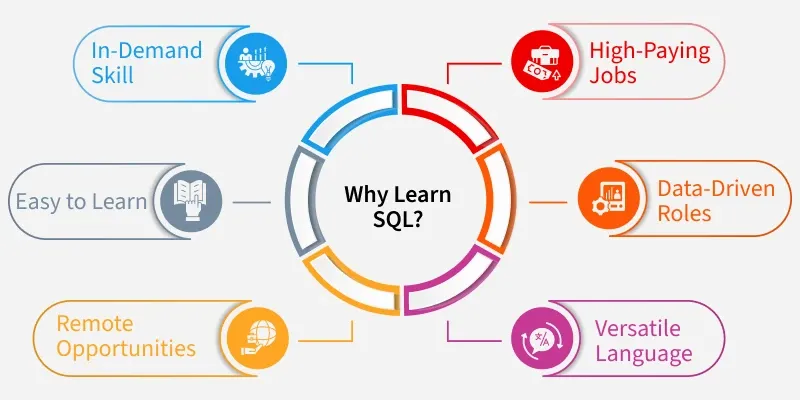SQL Career Path: Roles, Skills & Salaries
Last Updated :
07 Aug, 2025
SQL (Structured Query Language) is an essential skill for anyone working with data, from software testers to data scientists, developers and database administrators. With over 80% of businesses relying on databases to manage their operations, SQL remains a critical tool for querying, manipulating and managing data.

SQL skills open doors to a variety of high-paying roles. Whether you are starting as a data analyst or aiming for a database administrator position, SQL proficiency can lead to High-paying career paths. Below is a breakdown of popular roles requiring SQL and their average salaries in 2025:
Role | India (₹ LPA) | USA (USD/year) |
|---|
Data Analyst | ₹4 – ₹15 LPA | $60k – $100k |
Database Administrator | ₹4 – ₹47.8 LPA | $80k – $130k |
Software Tester (SQL) | ₹3 – ₹12 LPA | $55k – $90k |
Data Engineer | ₹5 – ₹25 LPA | $90k – $150k |
Backend Developer | ₹3 – ₹20 LPA | $70k – $120k |
Business Intelligence Analyst | ₹5 – ₹18 LPA | $65k – $110k |
Career Growth: With experience, SQL professionals can advance to roles like Senior Data Engineer, Database Architect or Data Scientist, with salaries in India reaching up to ₹50 LPA and in the USA exceeding $200k for senior positions.
The Growing Demand for SQL Skills
The demand for SQL expertise continues to grow as businesses transition to data-driven models. According to industry reports, SQL is one of the top 5 most in-demand tech skills in 2025, with companies like Google, Amazon, Microsoft and IBM seeking professionals who can manage and query databases effectively. SQL is critical for roles in software testing, data science and backend development, as well as for emerging fields like AI and cloud computing.

Industry Insights:
- Tech Giants: Companies like Amazon and Microsoft use SQL to manage massive datasets for cloud platforms (e.g., AWS RDS, Azure SQL).
- Finance and Retail: Banks like JP Morgan and retailers like Walmart rely on SQL for transaction processing and inventory management.
- Data Science and AI: SQL is used to extract and preprocess data for machine learning models, a key step in data science pipelines.
- Software Testing: Testers use SQL to validate data integrity, verify API responses, and set up test environments.
The Tech Boom: How SQL Fits In
The global digital transformation has made databases the backbone of modern applications. SQL is essential for managing relational databases, which stores data in structured tables, making it easy to query and analyze. From e-commerce platforms to healthcare systems, SQL enables businesses to:
- Retrieve customer data for personalized experiences.
- Validate application data during testing.
- Generate reports for business intelligence.
- Support scalable cloud-based applications.
Examples:
- E-commerce: Amazon uses SQL to manage product catalogs and order histories.
- Testing: Software testers query databases to verify data consistency in applications.
- Data Science: Data scientists use SQL to extract datasets for analysis in tools like Python or R.
Flexibility and Remote Work Opportunities
SQL is a highly flexible skill that supports remote work and freelancing. Many companies offer remote database-related roles, allowing professionals to work from anywhere. Freelancers can also take on projects like database optimization or data analysis on platforms like Upwork and Fiverr.
Remote Work and Freelancing
1. Work from Home: Roles like Data Analyst and Database Administrator often offer remote options, with companies like IBM and Google supporting flexible work environments.
2. Freelance Opportunities: SQL freelancers can work on projects like building database queries, optimizing performance, or setting up test data. Popular platforms include:
- Upwork
- Freelancer
- Fiverr
- Toptal
- PeoplePerHour
3. Hourly Rates: Experienced SQL freelancers can earn $30–$100 per hour globally, with Indian freelancers earning ₹500–₹2,000 per hour.
Continuous Learning in SQL: Staying Ahead of the Curve
SQL evolves with database technologies, and staying updated is key to remaining competitive. In 2025, SQL skills are enhanced by emerging trends and integrations:
Evolving Technologies:
- Cloud Databases: SQL is used with cloud platforms like AWS RDS, Google Cloud SQL, and Azure SQL Database.
- Big Data Integration: SQL interfaces with big data tools like Apache Spark and Hadoop for large-scale data processing.
- NoSQL and Hybrid Databases: While NoSQL databases (e.g., MongoDB) are popular, many support SQL-like querying (e.g., MongoDB’s Aggregation Framework).
- AI and Automation: SQL is used to prepare data for AI models, with tools like SQL Server Machine Learning Services integrating analytics.
Learning Resources:
- Courses: GeeksforGeeks offers SQL courses from beginner to advanced levels, covering querying, database design, and integration with testing frameworks.
- Certifications: Certifications like Microsoft Certified: Azure Data Fundamentals or Oracle SQL Developer boost employability.
- Practice Platforms: Practice SQL queries on platforms like LeetCode, HackerRank, or SQLZoo.
Reasons to Learn SQL
SQL is a gateway to a rewarding career in tech, offering numerous benefits for professionals in 2025:

- Career Opportunities and Job Growth: SQL skills are required for roles in data analysis, testing, backend development, and data science.
- High Earning Potential: Competitive salaries in roles like Data Engineer and Database Administrator.
- Remote Work and Flexibility: Work remotely or freelance on global projects.
- Creativity Meets Code: Design queries and database structures to solve unique business challenges.
- No CS Degree Required: SQL is accessible to non-CS backgrounds, with many self-taught professionals succeeding.
- Integration with Modern Tech: Use SQL with cloud platforms, AI, and automation tools.
- Launch Your Own Startup or Side Hustle: Build data-driven applications or offer freelance database services.
Lifelong Learning: Stay relevant with evolving database technologies and certifications.
SQL Skills for a High-Paying Job
To excel in SQL-related roles, mastering the following skills is essential:
- Querying: Writing efficient SELECT, JOIN, and subquery statements.
- Database Design: Creating normalized tables, indexes, and constraints.
- Data Manipulation: Using INSERT, UPDATE, DELETE, and transactions.
- Performance Optimization: Analyzing query plans and optimizing with indexes.
- Integration: Connecting SQL with tools like Python, Java, or testing frameworks.
- Security: Preventing SQL injection and managing user permissions.
SQL Certifications That Boost Salaries:
Certification | Why It Helps |
|---|
Microsoft Certified: Azure Data Fundamentals | Validates SQL skills for Azure-based databases; ideal for cloud roles. |
Oracle Certified Professional, MySQL Developer | Demonstrates expertise in MySQL; recognized globally for DBA roles. |
IBM Certified Database Associate | Covers DB2 and SQL fundamentals; valuable for IBM-related projects. |
PostgreSQL Certified Professional | Proves proficiency in PostgreSQL; in demand for open-source database roles. |
How to Increase Your SQL Salary:
- Master Cloud Databases: Learn AWS RDS, Azure SQL, or Google Cloud SQL to tap into high-paying cloud roles.
- Integrate with Automation: Combine SQL with Python or Java for automated testing or data pipelines.
- Get Certified: Certifications can increase salaries by 15–25%.
- Freelance or Consult: Offer database optimization or query-writing services on platforms like Upwork.
- Contribute to Open Source: Build a portfolio by contributing to open-source database projects.
Career Growth for SQL Professionals
SQL skills pave the way for diverse career paths, with opportunities to grow into advanced roles:
- Senior Data Analyst
- Database Administrator (DBA)
- Data Engineer
- Business Intelligence Developer
- Data Scientist
- Cloud Database Architect
Freelancing and Startups:
- Freelancers can offer services like database design, query optimization, or test data setup.
- Entrepreneurs can build data-driven startups, such as analytics platforms or SaaS applications
Explore
SQL Tutorial
7 min read
Basics
Queries & Operations
SQL Joins & Functions
Data Constraints & Aggregate Functions
Advanced SQL Topics
Database Design & Security